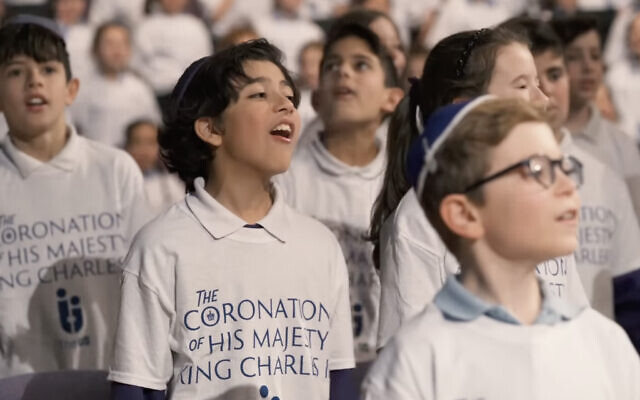UK Jewish children present new ‘Adon Olam’ for king’s coronation
Rendition of prayer song will be sung by school choirs at monarch’s ceremony next month

JTA — Among the many honors accruing to King Charles III in advance of his coronation next week: a new version of a traditional prayer performed by a British-Jewish children’s choir.
United Synagogue, the union of British Orthodox synagogues, commissioned a new recording of “Adon Olam,” a prayer perhaps most recognizable as the conclusion of Shabbat services, and dedicated it to the new king.
The rendition was composed by a British-Jewish musician who teaches at a Jewish school and was arranged by the brothers in the indie rock duo Portnoy, according to the Jewish Chronicle, a British Jewish newspaper.
The choir includes children from five Jewish schools who are accompanied by musicians from Ukraine.
Everyone involved is wearing a shirt for the coronation, planned for May 6, in a “We are the World“-style video released Friday.
The recording is part of a passel of celebrations that British communities are undertaking as they prepare to crown a new monarch for the first time in more than 70 years. Charles’ mother, Queen Elizabeth II, died in September after taking the throne in 1952.
“King Charles III has always been a stalwart personal friend to the Jewish community,” said Anthony Broza, chief executive of a music distributor company called Wienerworld that participated in the project.
“We hope that this new recording of Adon Olam will act as further recognition of the community’s affection for the Royal Family and our gratitude that Jews can observe their customs and traditions safely and openly in the UK,” he said.
England’s chief rabbi, Ephraim Mirvis, is reportedly sleeping at the king’s residence the night before the coronation so that he can attend without violating Shabbat.
The coronation will take place at Westminster Abbey, a royal church; while many Orthodox interpretations of Jewish law hold that Jews should not enter churches, London’s top rabbinical court ruled in the 1970s that chief rabbis may do so if their presence is requested by the monarch.









